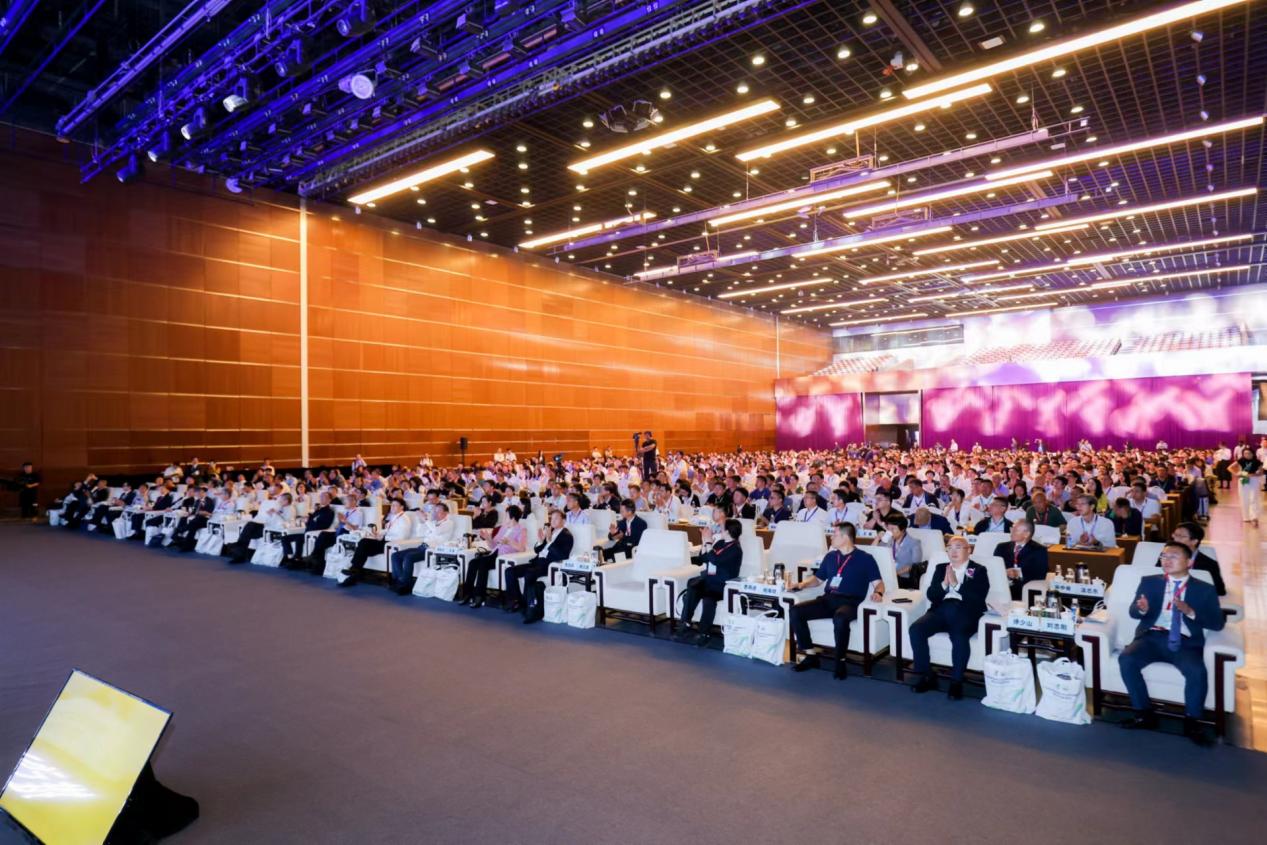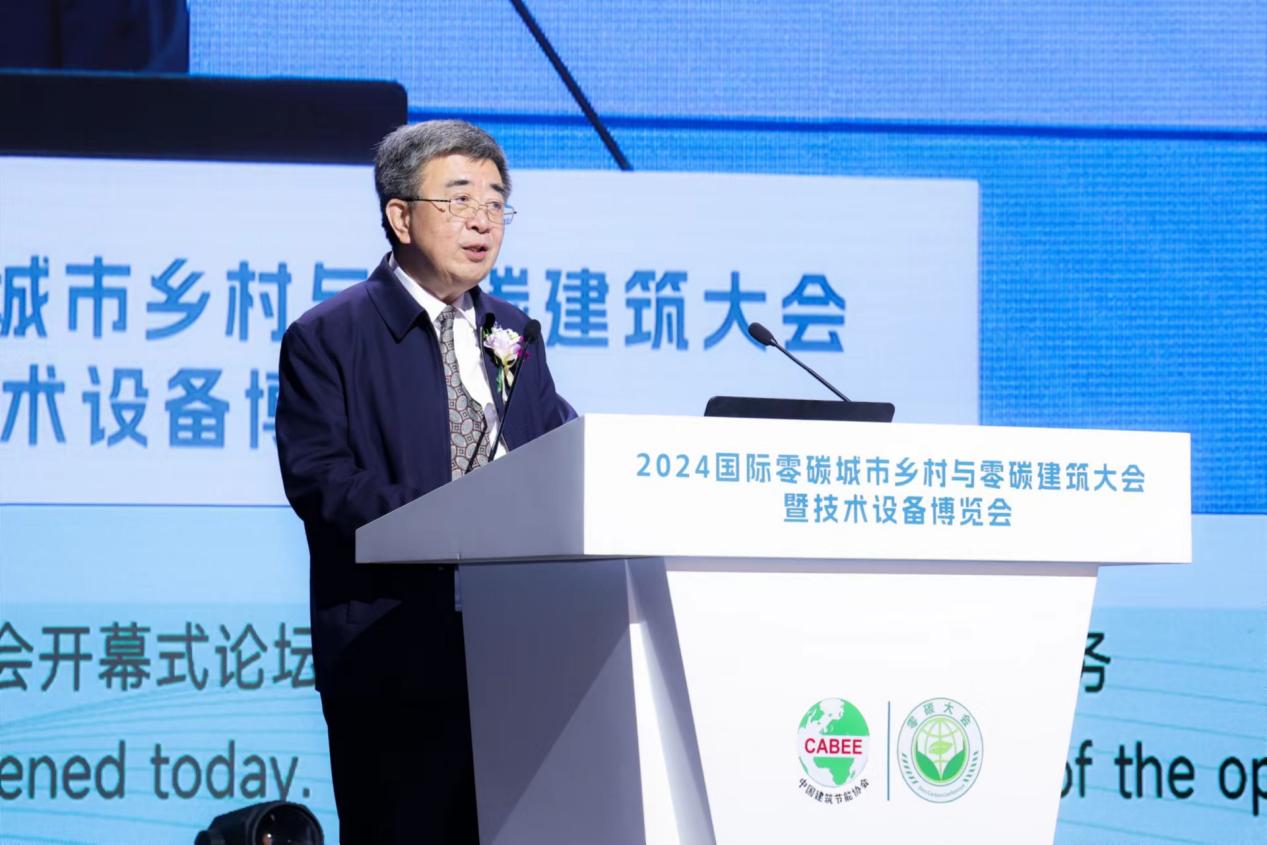The 2024 International Zero Carbon Urban and Rural and Zero Carbon Building Conference and Technology and Equipment Expo opened in Beijing
On May 26, the second "2024 International Zero-carbon Urban and Rural and Zero-carbon Building Conference and Technology and Equipment Expo" (hereinafter referred to as the conference) hosted by the China Association of Building Energy Efficiency opened in Beijing.

The scene of the conference
With the theme of "Promoting Zero-carbon Development of Buildings and Promoting Green and Low-Carbon Transformation of Urban and Rural Areas", the conference focused on the actual needs of global zero-carbon urban and rural construction under the "dual carbon" strategy, relevant policies and regulations, advanced technologies and standards, as well as the paths and methods to achieve zero-carbon buildings, further promote the high-quality development of zero-carbon buildings, and lead the urban, rural and construction industries towards a green future.
Ni Jiangbo, vice president of the China Association of Building Energy Efficiency and former first-class inspector of the Ministry of Housing and Urban-Rural Development's Standards and Quota Department, said at the opening ceremony that the field of building and urban-rural construction is a major consumer of energy consumption and carbon emissions in China, and its energy consumption and carbon emissions account for more than 20% of the total energy consumption and total carbon emissions of the whole society, and the proportion in developed countries is currently as high as about 40%. In the future, the energy consumption of buildings will increase dramatically, and the task of controlling carbon emission peaks is arduous, so we must start now.

Ni Jiangbo, vice president of China Association of Building Energy Efficiency and former first-level inspector of the Standards and Quota Department of the Ministry of Housing and Urban-Rural Development, delivered a speech
"At present, global climate change and ecological and environmental protection are becoming more and more severe, and green and low-carbon development has become a major issue faced by all countries around the world. The construction industry is one of the key areas to achieve China's dual carbon goals, and it is hoped that the field of building energy conservation will be guided by scientific and technological innovation, vigorously promote energy conservation, carbon reduction and pollution reduction, promote urban energy transformation and green and low-carbon city construction, and build a livable and resilient smart city. Zhao Penggao, deputy director of the Department of Environmental Resources of the National Development and Reform Commission, said at the meeting.
Lai Ming, a member of the Standing Committee of the National Committee of the Chinese People's Political Consultative Conference, said at the meeting that China should focus on the actual needs of implementing the "double carbon" strategy in the field of housing and construction, and dig deep into the problems that need to be solved in the industry. Practical solutions are proposed from different levels to help the research and governance of special planning and development strategies such as energy conservation and emission reduction and building energy conservation in the 15th Five-Year Plan. It is necessary to strengthen the research on policies and regulations, systematically sort out the new requirements for carbon peaking, carbon neutrality, and dual control of total carbon emissions and intensity of green and low-carbon development, and clarify the institutional needs for energy conservation and carbon reduction in the field of housing and construction, so as to continuously improve the policy system and innovate incentives such as finance, taxation and finance.
"In addition, we should pay attention to the supporting and leading role of scientific and technological innovation, further clarify the technical needs of the 'double carbon' goal in the field of housing and construction, and promote the research and development of key technologies, equipment, building materials, and products and the transformation of achievements. At the same time, we will actively explore the path and method of implementing the 'dual carbon' strategy in the field of housing and construction. Through the cases of pilot demonstration projects, we will sort out the implementation paths of 'dual carbon' that are generally applicable to different climate zones, different scales and different types, and form an effective experience that can be replicated and popularized. Lai Ming said.
In the theme report session, the morning mainly focused on the relevant policies, industry directions, technology trends, and development practices and experiences of zero-carbon cities at home and abroad in the field of green and low-carbon transformation in the field of urban and rural construction under the background of carbon peaking and carbon neutrality. Domestic and foreign experts shared reports such as "Green and Low-Carbon Transformation of the Real Estate Industry", "Decarbonization of the Construction Industry: Global Actions towards a Low-Carbon Future", and "Low-carbon Pathways of Urban and Rural Energy Supply Systems".
In the afternoon, we mainly focused on policies, regulations, solutions, and typical practice cases in the field of urban and rural construction to implement the "dual carbon" goal. Three reports, "Green and Low-Carbon Development of Urban Water System Pollution Control", "Urban Green Development and Green Renewal-China Council for International Cooperation on Environment and Development", and "Urban Rail Transit Land Intensive Utilization and Green and Low-Carbon Road", combined with relevant theoretical and practical explorations at home and abroad, summarized the urban development strategy under the "double carbon" goal, and put forward the development strategy and implementation path of eco-city in the new era from the aspects of spatial environment, green transportation, low-carbon industry, energy recycling, and support system.
The production stage of building materials such as cement and steel is the link with the largest energy consumption and carbon emissions in the whole construction process. It is imperative to accelerate the research on key technologies for green and low-carbon building materials. In addition, the annual generation of construction wood waste, waste furniture, landscaping branches and other urban wood waste disposal is also worrying, and the effective use of it is an important strategy to promote sustainable development and help realize the construction of ecological civilization. The two reports "Thoughts on Realizing Low-carbon and Green Building Materials" and "The Transformation of Construction and Urban Wood Waste to Carbon Sequestration Biomass New Energy" focused on the above issues.
The main measures to reduce carbon emissions in the building sector include improving quality and efficiency, full production capacity, energy transformation, renovation and renewal, and offset mechanism. In terms of technology, the application of building technology and artificial intelligence can effectively reduce energy consumption, reduce carbon emissions, and improve building energy efficiency. To achieve the "dual carbon" goal in the construction sector, government policy guidance, technological innovation support, and enterprises need to consciously fulfill ESG responsibilities. Three reports, "Building ESG: Why and How?", "Research and Practice Exploration of Timber Construction", and "Research on Control Indicators and Key Technologies of Zero-carbon Buildings", were shared from the perspectives of policy guidance, innovative technology, green building materials, and infrastructure construction.
The development of new quality productivity is the key to achieving green and low-carbon transformation. How to develop green productivity in the field of housing and construction and realize the green transformation of urban, rural and construction industries? The theme report of "Developing New Quality Productivity and Promoting the Green and Low-Carbon Transformation of the Industry" discusses this issue.
It is understood that the conference will last for 3 days, focusing on the three major sections of "energy transition", "urban and rural construction transformation" and "urban public infrastructure construction and resource recycling", with a total of one main forum, 36 special forums and 11,000 square meters of exhibitions. The conference brought together more than 300 leaders, academicians, scholars and authoritative experts from urban and rural construction departments, and attracted more than 1,000 representatives of leading enterprises to participate in in-depth discussions in related fields.







